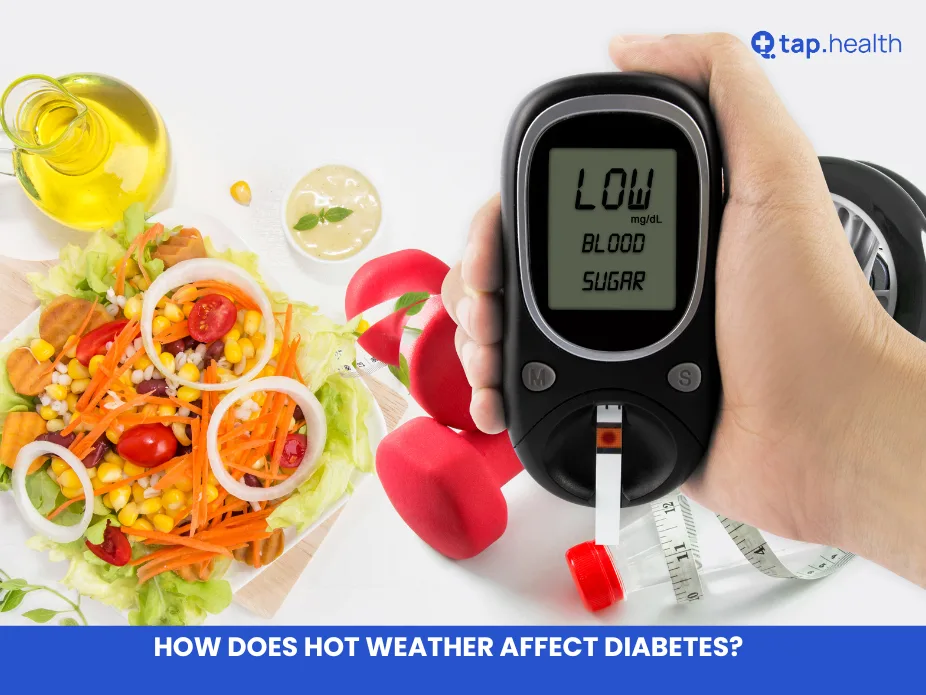Hot weather can be tough for anyone, but if you’re living with diabetes, the heat can pose unique challenges. From blood sugar fluctuations to dehydration, summer’s high temperatures require careful attention to manage your condition effectively. In this blog, we’ll explore how hot weather affects diabetes, share real-life examples, and provide expert tips to help you stay healthy and safe.
Why Does Hot Weather Impact Diabetes?
Hot weather affects everyone differently, but for people with diabetes, it can lead to specific problems:
1. Blood Sugar Fluctuations
- Dehydration: When you’re dehydrated, your blood sugar levels can rise due to reduced insulin sensitivity.
- Increased Energy Use: Heat can increase your body’s energy needs, leading to drops in blood sugar, especially if you’re physically active.
2. Reduced Insulin Effectiveness
Insulin, whether produced by your body or injected, is temperature-sensitive. If exposed to extreme heat, insulin can lose its potency, making blood sugar harder to control.
3. Heat and Nerve Damage
People with diabetes often experience nerve damage (neuropathy), which may make it harder to feel symptoms of heat-related illnesses like heatstroke.
How Hot Weather Affects Type 1 and Type 2 Diabetes
Both Type 1 and Type 2 diabetes can be affected by hot weather, but the way they manifest may vary:
- Type 1 Diabetes: Individuals may experience extreme blood sugar fluctuations due to a higher sensitivity to dehydration and heat.
- Type 2 Diabetes: Dehydration and reduced insulin effectiveness can lead to elevated blood sugar levels.
Alos read this – Which isotope is used for treatment of cancer
Real-Life Scenarios
Pooja’s Summer Struggles
Pooja, a 35-year-old teacher from Pune, noticed that her blood sugar levels spiked during the summer months. “I’d get headaches and feel exhausted more often,” she recalls.
After consulting her doctor, Pooja learned that the combination of dehydration and improper insulin storage was behind her symptoms. She started carrying a water bottle everywhere and used an insulated case for her insulin. “Now, I feel much more in control even during the hottest days,” Pooja shares.
Her story highlights the importance of hydration and proper medication storage during summer.
Expert Contributions
Insights from Dr. Sanjay Gupta, Endocrinologist
Dr. Sanjay Gupta, an endocrinologist based in Delhi, explains why hot weather requires extra vigilance for people with diabetes.
“Heat and diabetes are a tricky combination. Dehydration alone can lead to severe complications if not addressed promptly. Regular hydration, monitoring blood sugar levels more frequently, and storing insulin properly are key steps,” he advises.
He also recommends patients wear loose, light-colored clothing to prevent overheating and prioritize shaded or air-conditioned spaces during peak heat hours.
Recommendations Grounded in Proven Research and Facts
If you have diabetes, here’s how to handle the summer heat effectively:
1. Stay Hydrated
Dehydration can make blood sugar levels harder to manage. Keep a water bottle with you and aim to drink at least 8-10 glasses of water daily.
2. Monitor Blood Sugar Levels Frequently
Hot weather can cause unexpected spikes or drops in blood sugar. Check your levels more often, especially if you’re active outdoors.
3. Protect Insulin and Medication
- Store insulin in a cool, insulated bag or refrigerator.
- Avoid leaving medications in hot places, like a car or direct sunlight.
4. Dress for the Weather
Wear breathable, light-colored clothing and use a wide-brimmed hat or umbrella to shield yourself from the sun.
5. Plan Outdoor Activities Wisely
Engage in physical activities during cooler parts of the day, like early morning or evening. Avoid strenuous exercise during peak heat hours.
6. Recognize Heat-Related Illness Symptoms
Learn the signs of dehydration, heat exhaustion, and heatstroke, such as dizziness, confusion, or excessive sweating, and act immediately if they occur.
Factual and Reliable Information
Here are some important facts about how hot weather impacts diabetes:
- Dehydration Risk: High blood sugar levels cause you to urinate more, increasing your risk of dehydration.
- Heat Sensitivity: Diabetic neuropathy may reduce your ability to sense when your body is overheating.
- Insulin Sensitivity: Insulin becomes less effective in extreme heat, requiring more frequent monitoring and adjustments.
For more information, visit this reliable source from the American Diabetes Association.
FAQs on How Does Hot Weather Affect Diabetes?
Q1: Can hot weather cause high blood sugar?
A: Yes, dehydration caused by hot weather can lead to elevated blood sugar levels by reducing insulin sensitivity.
Q2: How can people with diabetes prevent heat-related illnesses?
A: Stay hydrated, wear appropriate clothing, avoid peak heat hours, and monitor blood sugar levels frequently.
Q3: Does insulin go bad in the heat?
A: Yes, insulin can lose its effectiveness if exposed to extreme heat. Always store it in a cool, insulated bag or refrigerator.
Q4: Are people with diabetes more prone to heatstroke?
A: Yes, due to complications like dehydration and neuropathy, people with diabetes are at a higher risk of heatstroke.
Q5: Is it safe for people with diabetes to exercise in hot weather?
A: Yes, but exercise during cooler parts of the day, stay hydrated, and monitor your blood sugar before, during, and after physical activity.



